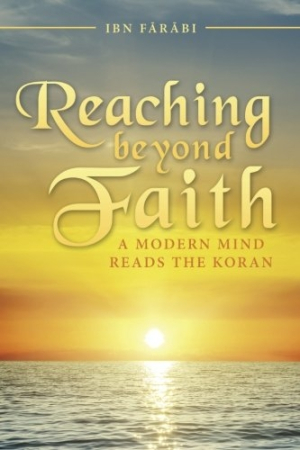Reaching beyond Faith
A Modern Mind Reads the Koran
This is a necessary exegetical resource for those who wish to understand the Koran in a pluralistic context.
In his refreshing and insightful Reaching Beyond Faith, Ibn Farabi treads the waters between blind faith in and a deep understanding of his subject, the Koran. His project can be considered a model for Muslims and students of religion who are willing to “reach beyond pure faith” and investigate the historic, geographic, social, and human underpinnings of the sacred text.
Farabi, who chose a pen name to protect himself from the intolerant few, asks the tough questions that, he asserts, have been avoided or glossed over by many other exegetes of the Koran. He notes the many “human decisions” that must have been made in producing a text said to have been dictated by an angel to the prophet Muhammad but not compiled until after his death. Farabi points out, always with quotes and citations, inconsistencies in the arrangement of verses and in the voice of the divinely inspired narration, as well as “curious” or “perplexing” omissions and contradictions.
At the same time, the author balances his critique with context that helps to clarify the text. He discusses the difficulty that must have characterized the transmission and compilation of the Koran’s 6,300 verses in a time before paper, when almost all Arabs were illiterate. He shows how living conditions and climactic events in seventh-century Arabia may have influenced themes and specific verses. By matching verses with events that were taking place at the time these verses were inspired, Farabi makes connections or exposes discrepancies, abrupt shifts, and undeveloped themes that less analytical exegetes have overlooked.
For example, Farabi questions Muhammad’s mistreatment of prisoners and apparent lack of compassion for “unbelievers.” He also questions the inconsistency of divine instructions to “save alive nothing that breatheth,” in one verse, and a call for tolerance of monotheistic believers in another verse. Yet he also presents verses of God’s support and comfort for the prophet and verses of God’s call, through the prophet, to charity and virtue.
While Farabi is not an acknowledged Koranic scholar, he claims to be an “informed reader” of the Koran. His bibliography lists six cited translations of the Koran in addition to the many other scholarly works cited. As he points out, doubt and critique are “anathema” to violent Islamists who read the Koran with a rigid fixation on its most aggressive messages, without consideration of context.
For those like Farabi who are committed to “more tolerant, vibrant and pluralist societies in the Islamic world,” this study of the Koran is a necessary resource.
Reviewed by
Joe Taylor
Disclosure: This article is not an endorsement, but a review. The publisher of this book provided free copies of the book and paid a small fee to have their book reviewed by a professional reviewer. Foreword Reviews and Clarion Reviews make no guarantee that the publisher will receive a positive review. Foreword Magazine, Inc. is disclosing this in accordance with the Federal Trade Commission’s 16 CFR, Part 255.

